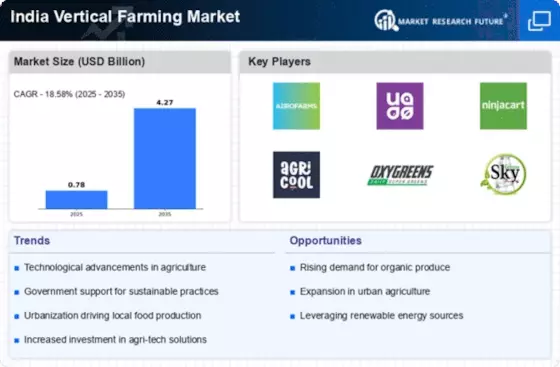Top Industry Leaders in the India Vertical Farming Market

Competitive Landscape of India Vertical Farming Market
India vertical farming market is on the cusp of significant growth, driven by several compelling factors. Limited arable land due to population increase and urbanization necessitates alternative solutions. Vertical farming, with its efficient use of space and reduced water consumption compared to traditional methods, offers a promising answer. Additionally, rising disposable incomes and health awareness are fueling demand for fresh, high-quality produce, which vertical farms can provide year-round with consistent quality control. Government support through subsidies, tax breaks, and research grants further strengthens the market's potential.
Some of the India Vertical Farming companies listed below:
- UrbanKisaan
- Triton Foodworks
- FF Agro Technologies Pvt Ltd
- Sparsh Bio Life
- URBAN GREEN FATE FARMS
Strategies Adopted by Key Players:
-
Technology Focus: Established players often leverage their expertise in controlled-environment agriculture (CEA) technologies like hydroponics and LED lighting to offer turnkey solutions for vertical farms. -
Strategic Partnerships: Collaboration with research institutions, agricultural universities, and government agencies allows established players to access cutting-edge technology, improve crop varieties, and navigate regulatory hurdles. -
Focus on Specific Crops: Some companies specialize in cultivating high-value crops like leafy greens, herbs, and fruits in vertical farms, catering to premium markets and urban consumers. -
Scalability and Efficiency: Established players focus on developing scalable vertical farming models that can be replicated across different locations and offer high production efficiency.
Market Share Analysis Factors
-
Market Share: The percentage of total revenue generated in the Indian vertical farming market captured by a company. -
Technology Expertise: The level of a company's knowledge and experience in CEA technologies, automation systems, and data management for vertical farms. -
Project Track Record: A company's history of successfully implementing vertical farming projects, including farm size, crop variety, and operational efficiency. -
Clientele and Partnerships: The types of clients a company serves (restaurants, supermarkets, individual consumers) and their partnerships with relevant stakeholders in the agricultural industry. -
Financial Strength: A company's financial resources to invest in research and development, build new farms, and expand its operations across India.
New and Emerging Companies:
-
Cost-Effective Solutions: Catering to the budget constraints of potential customers, some new companies develop and offer vertical farming solutions with lower initial investment costs. -
Modular Farm Designs: Emerging companies might specialize in designing and building modular vertical farms that can be easily scaled up or down based on space availability and production needs. -
Focus on Local Crops: Some new entrants concentrate on cultivating traditional Indian vegetables and herbs in vertical farms, catering to local preferences and reducing dependence on imported produce. -
Integration with Technology: New companies might leverage advancements in automation, Internet of Things (IoT) sensors, and data analytics to optimize vertical farm operations and improve resource efficiency.









